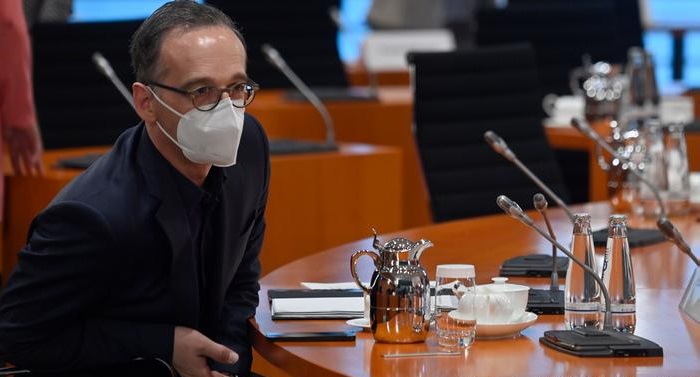
European Union foreign ministers meeting in Luxembourg on Monday are set to increase the pressure on Belarus President Alexander Lukashenko by blacklisting dozens more supporters of his regime.
German Foreign Minister Heiko Maas has called for broad economic sanctions against Minsk in light of the forced landing of a Ryanair flight in order to detain a dissident journalist.
"I think additional sanctions against Belarus are unavoidable," Maas told German newspaper Die Welt.
"We should extend the sanctions to parts of the Belarusian economy, such as the potash industry or the energy sector. And we should deprive the government in Minsk of the possibility to raise funds within the EU by issuing government bonds," he said.
Forced landing causes widespread turbulence
Belarusian strongman Lukashenko sparked widespread outrage by dispatching a fighter jet on May 23 to intercept a flight from Greece to Lithuania, eventually forcing the plane to land in Minsk, before arresting dissident journalist Raman Pratasevich and his girlfriend Sofia Sapega who were onboard.
The European Union subsequently blocked Belarusian airlines from flying to the bloc, while it has also stopped carriers from its 27 nations from using Belarus' air space.
According to EU diplomats speaking to various news agencies, the foreign ministers convening in Luxembourg are likely to formally agree to placing more than 80 additional individuals and entities on an assets freeze, as well as imposing a visa ban upon them.
Lukashenko has ruled Belarus since 1994. He has so far managed to shrug off pressure from the West, while retaining the support of Russian President Vladimir Putin.
Exiled opposition leader Sviatlana Tsikhanouskaya, who insists she won last year's national election, will talk with the ministers in Brussels ahead of their summit on Monday.
Refugee arrangement with Turkey under the microscope
Meanwhile, Germany's Foreign Ministry is calling for a renewed focus on the EU's refugee deal with Turkey.
"We need an update to our migration cooperation with Turkey," Heiko Maas told Die Welt.
"In all the difficulties we have with the Turkish government, we must acknowledge that the country has taken on a not-inconsiderable migration burden for us," Maas said.
A new accord would likely mean additional funding for Turkey, he said.
"I don't want to put any numbers out into the world, but it is completely clear that it won't work without money," Maas said.
The existing refugee deal between the EU and Turkey includes provisions for Ankara to crack down on unauthorized migration to the bloc, and for Greece to send migrants who have reached the Aegean islands illegally back to Turkey.
In return, the EU takes one recognized Syrian refugee from Turkey for every Syrian sent back. Brussels also provides financial support to the homeland of the refugees in order to take care of them.